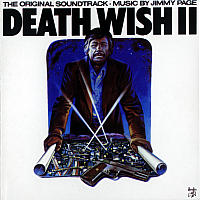
Led Zeppelin were an English rock band formed in London in 1968. The group comprised vocalist Robert Plant, guitarist Jimmy Page, bassist/keyboardist John Paul Jones, and drummer John Bonham. With a heavy, guitar-driven sound, they are cited as one of the progenitors of hard rock and heavy metal, although their style drew from a variety of influences, including blues and folk music. Led Zeppelin have been credited as significantly impacting the nature of the music industry, particularly in the development of album-oriented rock (AOR) and stadium rock.
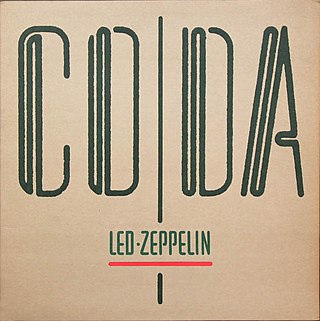
Coda is the first compilation album by the English rock band Led Zeppelin. The album is a collection of unused tracks from various sessions during Led Zeppelin's twelve-year career. It was released on 19 November 1982, almost two years after the group had officially disbanded following the death of drummer John Bonham. The word coda, meaning a passage that ends a musical piece following the main body, was therefore chosen as the title.
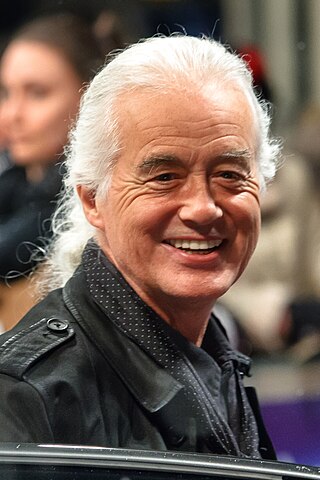
James Patrick Page is an English musician who achieved international success as the guitarist and founder of the rock band Led Zeppelin. Page is prolific in creating guitar riffs. His style involves various alternative guitar tunings and melodic solos, coupled with aggressive, distorted guitar tones. It is also characterized by his folk and eastern-influenced acoustic work. He is also noted for occasionally playing his guitar with a cello bow to create a droning sound texture to the music.
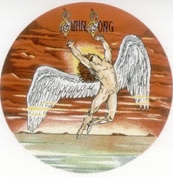
Swan Song Records was a record label launched by the English rock band Led Zeppelin on 10 May 1974. It was overseen by Led Zeppelin's manager Peter Grant and was a vehicle for the band to promote its own products as well as sign artists who found it difficult to win contracts with other major labels. The decision to launch the label came after Led Zeppelin's five-year contract with Atlantic Records expired at the end of 1973, although Atlantic ultimately distributed the label's product.
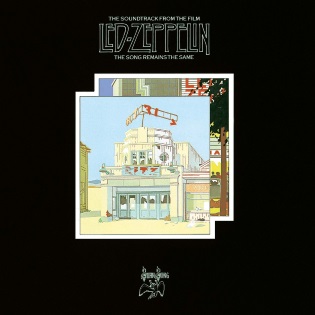
The Song Remains the Same is the live soundtrack album of the concert film of the same name by the English rock band Led Zeppelin. The soundtrack was recorded 27–29 July 1973 and released on 28 September 1976 on Swan Song Records.
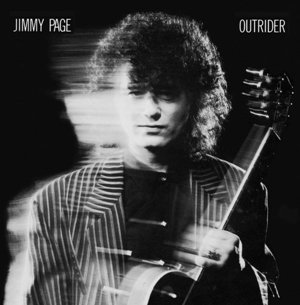
Outrider is an album by Jimmy Page, released by Geffen Records on 19 June 1988. It is his first solo studio album and the first time since 1969 he has recorded with a record label other than Atlantic Records/Swan Song Records. Page recorded the music at his personal studio The Sol. Robert Plant guests on one track, "The Only One", while John Bonham's son Jason plays drums.

Edwin H. Kramer is a British recording producer and engineer. He has collaborated with several artists now in the Rock and Roll Hall of Fame, including Jimi Hendrix, the Beatles, David Bowie, the Rolling Stones, Led Zeppelin, Eric Clapton, the Kinks, Kiss, John Mellencamp, and Carlos Santana, as well as records for other well-known artists in various genres, including Anthrax, Joe Cocker, Loudness, Peter Frampton, John Mayall, Ten Years After, Mott the Hoople, John Sebastian, Carly Simon, Dionne Warwick, Small Faces, Sir Lord Baltimore and Whitesnake.

Chris Farlowe is an English rock, blues and soul singer. He is best known for his hit single "Out of Time" written by Mick Jagger and Keith Richards, which rose to No. 1 in the UK Singles Chart in 1966, and his association with bands Atomic Rooster, the Thunderbirds and Colosseum. Outside his music career, Farlowe collects war memorabilia.
"Travelling Riverside Blues" is a blues song written by the bluesman Robert Johnson. He recorded it on June 20, 1937, in Dallas, Texas, during his last recording session. The song was unreleased until its inclusion on the 1961 Johnson compilation album King of the Delta Blues Singers.

The Firm were a British rock supergroup formed in 1984, featuring singer Paul Rodgers, guitarist Jimmy Page, drummer Chris Slade, and bass player Tony Franklin. The band released two albums in 1985 and 1986 and eventually saw their greatest chart success with the songs "Radioactive", "All the King's Horses", and "Satisfaction Guaranteed".
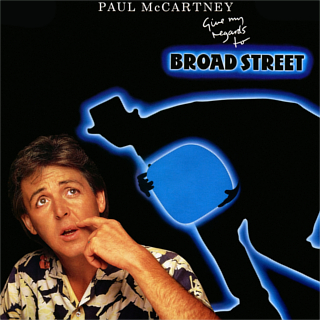
Give My Regards to Broad Street is the fifth solo studio album by Paul McCartney and the soundtrack to the film of the same name. The album reached number 1 on the UK chart. The lead single, "No More Lonely Nights", was BAFTA and Golden Globe Award nominated. It was also to be his final album to be released under Columbia Records, which had been his US label for over five years.
"Carouselambra" is the fifth song on Led Zeppelin's 1979 album In Through the Out Door. The title refers to the first section of the song that has similarities to carousel music. At more than 10 minutes in length, the song is the second-longest the band recorded in the studio. John Paul Jones' synthesizers dominate the song, with Jimmy Page's guitar playing a supporting role.

"In My Time of Dying" is a gospel music song by Blind Willie Johnson. The title line, closing each stanza of the song, refers to a deathbed and was inspired by a passage in the Bible from Psalms 41:3 "The Lord will strengthen him upon the bed of languishing, thou wilt make all his bed in his sickness". Numerous artists have recorded variations, including Bob Dylan and Led Zeppelin.
"We're Gonna Groove" is a song written by soul artist Ben E. King and later co-credited to James Bethea. In 1964, it was released as the single B-side of King's rendition of "What Now My Love".

Great Zeppelin: A Tribute to Led Zeppelin is a cover album released by the American hard rock band Great White in 1998, dedicated to songs of Led Zeppelin. It was recorded live in a concert that took place at The Galaxy Theatre of Santa Ana, California in December 1996 and released by the French label Axe Killer. The American edition was issued by Deadline Records in 1999. Deadline Records also issued a very rare vinyl version of the album in 1999, omitting 4 tracks due to time limitations of vinyl. Songs from this album appear on many compilations and also on re-issues of older albums as bonus tracks. The album was re-issued in 2005 by the Canadian label Legacy, with the title Great White Salutes Led Zeppelin. The entire album appears also on Great White's double-CD compilation A Double Dose issued by Deadline Music in 2005, along with the album of covers Recover.

Scream for Help is a soundtrack album by John Paul Jones, released by Atlantic Records on 22 March 1985 to accompany the film Scream for Help. Following the Death Wish II album project, guitarist Jimmy Page was asked by his Berkshire neighbour, movie director Michael Winner, to record a soundtrack for the film Scream for Help in August 1984. Due to other commitments by Page, he instead suggested to Winner that Jones, who had just completed upgrading his 24-track digital recording studio at Devon, was best placed to write and record the soundtrack. In return, Jones asked Page to help record two tracks "Crackback" and "Spaghetti Junction".

Sol Studios is a recording studio located in Cookham, Berkshire, England. The recording studio and control room are part of the complex property, along an old watermill and residential wheelhouse in the countryside. The property was bought in 1974 by Gus Dudgeon, and the recording studio was built in the following year. Gus ran the studio as his own production facility until running into financial trouble when the studio was sold to Led Zeppelin's Jimmy Page. Page decided to revert to the old name of "The Sol".

In Through the Out Door is the eighth and final studio album by the English rock band Led Zeppelin. It was recorded in three weeks in November and December 1978 at ABBA's Polar Studios in Stockholm, Sweden, and released by Swan Song Records on 15 August 1979. Unlike earlier Led Zeppelin albums, In Through the Out Door was dominated musically by John Paul Jones. It was the band's last studio release before they disbanded in December 1980 after the death of their drummer John Bonham three months earlier.
The Led Zeppelin Deluxe Edition is a series of albums reissued by English rock group Led Zeppelin, distributed by Atlantic Records. It contains all nine of the original Led Zeppelin studio albums remastered from the original analog tapes. Along with the remastered albums, there is a companion disc with each album, consisting of previously unreleased audio tracks and alternate mixes of released tracks. Many of these are described as work-in-progress or alternate mixes made during the original production rather than new remixes generated to highlight discarded recording elements. The first companion album consists of the 10 October 1969 concert in Paris. The albums were released in chronological order, each with inverted album covers.
